It’s no secret: we’re fans of API first companies like Twilio. With more than ten million customers using their platform, it seems we’re not alone.
Longtime the darling of developers, Twilio’s approachable platform makes it easy to send voice, video, and SMS messages across nearly any context.
Today, we’re diving into how Twilio stays true to its product-led roots.
Low-Code/No-Code Functionality
“Build or Buy,” that is the question. As in the classic Shakespearean dilemma, “to be or not to be,” a choice must be made. For SaaS companies, the cost to add new features once meant building those features in-house, or paying an external vendor for added functionality. Both options posed serious challenges.
There is now a third option. Low-Code/No-Code (LC/NC) tools offer added capability without the need to write complex code. Software that may normally take months to build can be released in weeks using LC/NC tools. Naturally, the option is already gaining popularity.
The trend isn’t lost on Twilio, who rolled out Twilio Studio in late 2017. Twilio Studio lets customers enjoy robust communication infrastructure without any need to write code. This is great for non-technical users, as well as lean engineering teams looking to build quickly.
Streamlined User Interface
Twilio’s interface provides both ease and control. Developers and product managers alike need not fear decision fatigue here. Like a Bentley, Twilio drives smoothly while packing lots of power under the hood.
In onboarding alone, it’s easy to see what makes Twilio’s interface so great.
Setting Expectations
From the beginning, Twilio lets the user know what to expect. Anticipating that someone might wonder, “how much is Twilio,” Twilio immediately lets users know that no upfront payment is due.
This is a gentle introduction to the transparency they deliver on every aspect of the platform. Twilio is also quick to let users know what they can do with their product. See the below element from their early onboarding process as an explanation.
In just these first few minutes of onboarding, you will already know that Twilio doesn’t plan to surprise you. Deeper into the platform, they continue to present new information in the same way.
Less is More
“Perfection is achieved, not when there is nothing more to add, but when there is nothing left to take away.” - Antoine de Saint-Exupery
If there is one word to describe Twilio’s interface, it is “precise.” Uncluttered menus, well-placed tool tips, and strong visual design create a clean user interface.
Every choice presented to the user is intentionally simplified, without losing meaning. Once a user completes the above steps, they offer focused quizlets to customize the user’s new account. The wording is direct, unambiguous, and approachable. Meanwhile, the number of choices presented to the user offers customization without overwhelm.
After those few steps, initial onboarding is complete. From here, users are directed to their dashboard for the first time.
Users immediately get to test-drive Twilio’s full functionality. A free user has the chance to set up a Twilio phone number, add teammates, and to try out Twilio Studio for a LC/NC experience.
Diversified Help Resources
Meanwhile, accessible support resources ensure that anyone who needs the details can find them. These resources are available through multiple, thoughtful links, ensuring that all users get the information they need.
Users may opt to learn about Twilio through help articles, docs, a guided tour, and even a game, Twilio Quest.
Overall, Twilio’s interface provides exactly what it needs to, without compromising user experience.
They Were Among the First “Developer-First”
Before Twilio was a post-IPO unicorn, they weren’t known for selling like a typical enterprise SaaS company. They often didn’t “sell” at all. Yet, they still grew.
One famous story about founder Jeff Lawson illustrates this perfectly.
“ABOUT A YEAR AFTER LAWSON and two friends founded Twilio in 2008, Lawson was invited to introduce it at a popular networking mixer called the SF New Tech Meetup. Rather than talk about an inherently difficult-to-explain technology, Lawson decided to let the Twilio software speak for itself. In front of a thousand people Lawson began telling his story while simultaneously coding a Twilio app—a simple conference line.
In just a few minutes he opened an account and secured a phone number, and after writing a handful of lines of code that everyone in the room could understand, his conference line was up and running. Lawson then asked everyone to phone in, and just like that a mob of developers was on a giant conference call. Lawson then added some more code, and his app called everyone back to thank them for participating. As phones throughout the room began buzzing, the crowd went wild with enthusiasm. “ – Miguel Helft, Forbes
Try Before You Buy
Twilio offered developers the chance to try their product without expectation of purchase. Though counter to the dominant enterprise sales model of the time, skipping upfront costs earned the trust of developer communities. Quickly, Twilio developed a reputation as an accessible tool for any project.
Twilio doesn’t see developers only as potential customers, they see a community. Some even credit Twilio for popularizing Developer Evangelism. Though their payment model is just one part of their developer-led strategy, it’s one that’s still making their product great.
Any free user creating a Twilio account will find a robust suite of powerful features. Free trial users are entitled to a Twilio phone number, allowing them to try out voice call, video conferencing, and SMS messaging functionality. As a result, even Twilio’s free capabilities provide a realistic preview of their paid plans.
Flexible Pricing Options
If a user decides to exceed their $15.50 trial balance, provided complimentary with signup, their bill scales seamlessly with PAYG pricing. To learn more about the PAYG model, see our other post here.
When a new user wants to become a customer, they’ll find plan options for any situation. This is great for nearly any type of user, whether they are looking to build projects experimentally, for fun, or for vital infrastructure. Almost any use case can be accommodated.
Why We Like Twilio
If anything is constant in the world of software, it’s change. As a company staking its future on our belief that every company will become an API company, we look forward to seeing other API-first companies grow.
Twilio continues to adapt to the changing realities of SaaS - it meets every new challenge with adaptation. We aspire to similar resiliency here at Moesif, which is why we offer transparent pricing features and streamlined onboarding.
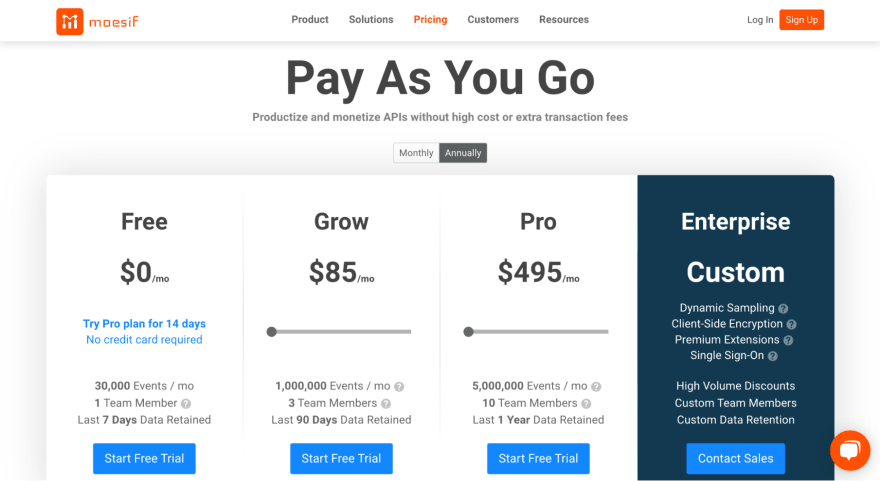
Moesif offers four plan tiers with flexible PAYG billing on each tier
Our pricing model combines the flexibility of Pay-As-You-Go with the reliability of subscriptions. Users can benchmark their monthly use with one of our four pricing tiers. But, if they use far less or more of our service than anticipated, then their monthly bill will reflect that actual usage.
Similarly to Twilio, we too aim for ease in our onboarding process. For most installations, Moesif needs only a few lines of code to add our SDK. Each onboarding workflow is easily customized to the user’s existing tech stack. Like Twilio, our platform aims to reduce decision fatigue by offering targeted information.
Like Twilio, we also offer a “try before you buy” model. This way, Moesif users can experience the full capabilities of our product before making a decision. Anyone can become a user by signing up for a free trial here.
Overall, we think Twilio is a “leader” in customer engagement for good reason. Its clean user experience, commitment to developer communities, and speed of innovation certainly make it a great choice for communication infrastructure. In other words, those ten million customers aren’t leaving anytime soon!



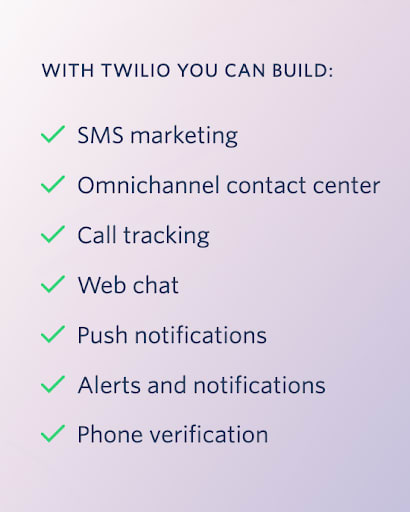


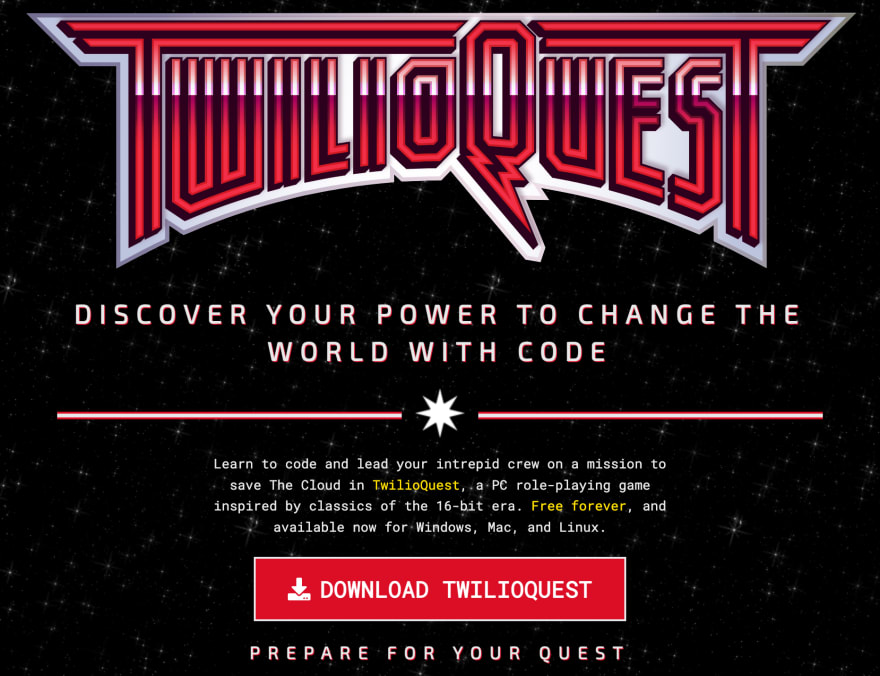
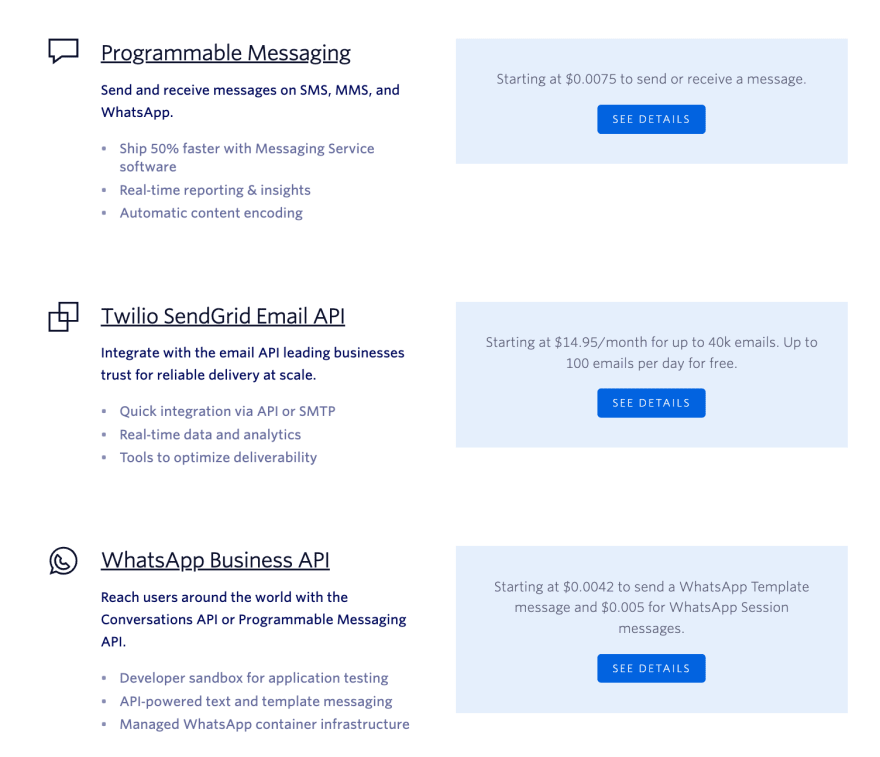
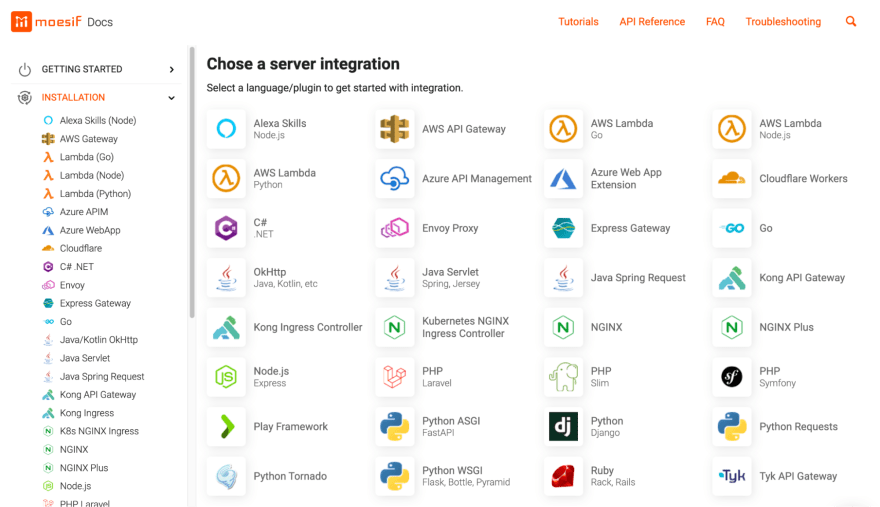

Top comments (0)